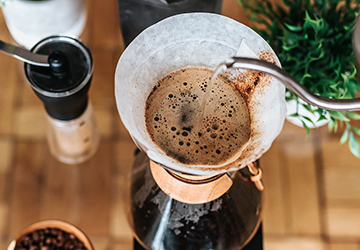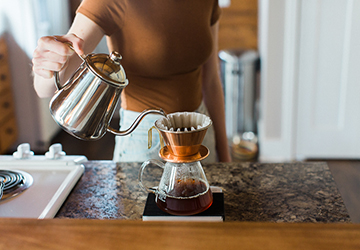The art of brewing coffee has evolved considerably over the years, moving from instant coffee mixes to intricate brewing processes that extract coffee beans' true essence and flavors. The rise of artisanal coffee methods highlights the brewing process's significance in determining the final cup's quality and taste. If you're a coffee enthusiast eager to master brewing the perfect cup of artisanal coffee, this article is just for you. We will delve into the core elements:
· Choosing the best coffee beans
· Understanding the critical coffee brewing techniques
· Employing artisanal methods for a heavenly cup every time
· Understand the Essence of Artisanal Coffee Methods
Artisanal coffee methods emphasize understanding the coffee bean's Origin, type, and roast. Unlike industrial processes, artisanal methods cherish the unique characteristics of each batch. This involves paying attention to detail, from bean selection to the final brew.

1. Pour-Over: This method allows for precise control over the brewing process. By manually pouring water over the coffee grounds, one can adjust the pouring pattern, ensuring even extraction of flavors.
2. French Press: Known for its rich and robust flavors, this method involves immersing coffee grounds in hot water, allowing complete extraction before pressing down with a metal or nylon mesh sieve.
3. Cold Brew: Specially suited for hot climates, cold brew is made by steeping coffee grounds in cold water for an extended period (typically 12-24 hours).
Choosing the Best Coffee Beans
While artisanal coffee methods take center stage, choosing the best coffee beans is equally vital. Investing in high-quality beans ensures your brewing techniques shine.
a. Origin Matters: Beans from different regions possess unique flavor profiles. Understanding Origin can guide your selection, whether the fruity notes from African beans or the chocolaty undertones of South American beans.
b. Freshness is Key: Always opt for freshly roasted beans. The freshness of a bean can significantly influence the taste, with stale beans leading to a flat and uninspiring brew.
c. Grind to Order: Grind beans just before brewing for optimal flavor. The granularity of the grind should match your brewing method; for instance, a coarse grind works best for a French Press, while a medium task is ideal for a pour-over.
Mastering Coffee Brewing Techniques
Perfecting your coffee brewing techniques is the secret sauce to an exceptional cup of coffee.
● Water Temperature: While boiling water might seem logical, it can scorch the coffee grounds. Aim for a temperature between 195°F to 205°F.
● Brewing Time: The brewing time can vary depending on your method. A French Press might take 4-5 minutes, while a pour-over might only require 2-3 minutes.
● Coffee-to-Water Ratio: This is crucial in determining the strength of your brew. A standard ratio of 2 tablespoons of coffee for every 6 ounces of water can be adjusted based on personal preference.
Embracing the Ritual
Beyond the science and the techniques, brewing the perfect cup of artisanal coffee is also about the experience. The process of selecting the best coffee beans, measuring, grinding, and employing the desired coffee brewing techniques becomes a ritual over time. The beauty of artisanal coffee methods is that they allow each individual to create a way that is in tune with their tastes and preferences.
Exploring Coffee Varieties
Understanding the vast range of coffee varieties is paramount when diving deeper into artisanal coffee methods. It's about picking the best coffee beans and the array that best compliments your brewing technique.
● Arabica: Known for its sweet, soft taste and higher acidity.
● Robusta: Has a more robust, harsher taste than Arabica and contains more caffeine.
● Liberica: Unique, with a somewhat smoky or woody taste.
● Excelsa: Often used to provide a tart, fruity profile in blends.
The Role of Coffee Roasts
One must recognize the importance of roasting when discussing coffee brewing techniques and methods.
● Light Roast: Retains most of the original coffee characteristics, has a toasted grain taste and pronounced acidity.
● Medium Roast: Exhibits more balanced flavor, aroma, and acidity.
● Dark Roast: Offers a robust, smoky taste as the flavors of the roasting process come to the forefront.

The Water Factor
It's easy to overlook water quality, but every element matters when perfecting artisanal coffee methods.
● Mineral Content: Highly mineralized water can alter the taste of your coffee, sometimes lending a metallic taste.
● Filtered vs. Tap: Where possible, use filtered water. Some tap waters have impurities that can interfere with the extraction process.
● Temperature Consistency: Using a kettle with temperature control can ensure consistent water temperatures every time, which is crucial for consistent brewing.
Equipment Maintenance
Maintaining your equipment is essential to extract the best flavors using coffee brewing techniques.
● Regular Cleaning: Coffee oils can build up over time, affecting the taste. Regular cleaning prevents old residues from contaminating fresh brews.
● Quality Check: Periodically check your equipment for signs of wear and tear. For instance, a worn-out mesh in a French Press might allow coffee grounds to slip through.
● Calibration: If using electronic equipment, like an electronic grinder, calibrate regularly to ensure consistent grind sizes.
Sustainability in Coffee Brewing
Being eco-conscious is becoming central to many modern artisanal coffee methods.
● Bean Sourcing: Opt for sustainably sourced beans, ensuring environmental and economic sustainability.
● Reduce Waste: Consider methods that reduce paper waste, like metal mesh filters instead of paper ones.
● Energy Consumption: Brewing methods like cold brew or manual pour-overs consume less energy than electric coffee machines.
Conclusion
The journey to a perfect cup of coffee is both an art and a science. While understanding the nuances of artisanal coffee methods, selecting the best coffee beans, and mastering essential coffee brewing techniques are necessary, the most crucial ingredient remains the love and passion for coffee. So, the next time you brew, take a moment to savor the process and the delightful aromas, and you'll undoubtedly enjoy the best cup of coffee you've ever had.
-
Why Choose a Ferret as Your Furry Companion?
When people embark on the journey of pet ownership, the limelight typically falls on animals like dogs or cats. Ferrets, however, offer a unique blend of qualities that are often overlooked but incredibly rewarding.
-
How to Train Your Rabbit to Jump Through Hoops
So, you've got a cute little rabbit and a set of hoops, and you're thinking, "Wouldn't it be awesome if my bunny could jump through those hoops?" The idea of your fluffy friend soaring through the air is not just a whimsical dream – it's an achievable reality!
-
The Hottest Colors Defining Fashion This Year
Are you ready to infuse some color into your wardrobe this year? Wondering what hues are setting the tone for the season? You’ve come to the right place! Fashion colors are making bold statements this year, ranging from vivid, eye-catching tones to more subtle and sophisticated shades. Whether you're refreshing your outfits or planning your next fashion purchases, knowing the hottest colors of the year is essential to staying ahead of the trends. Let’s explore the must-have colors that are defining fashion in 2025 and how you can incorporate them into your everyday look!